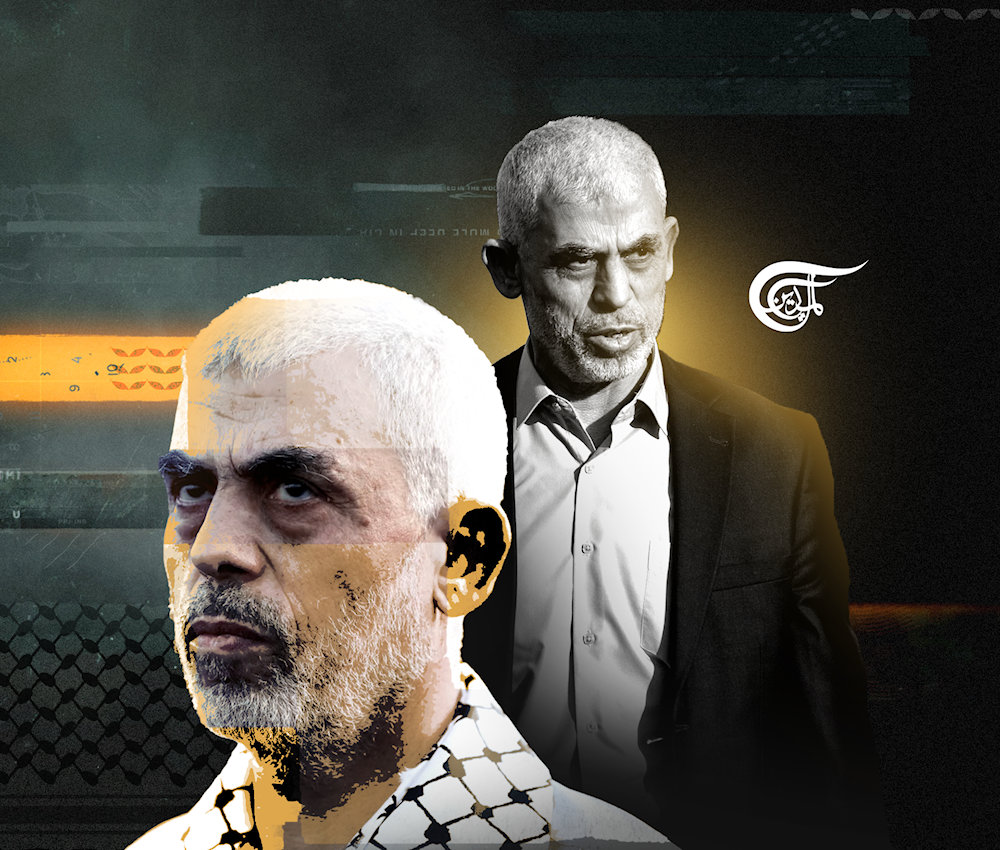What are the implications of Yahya Sinwar’s death?
The Israeli military’s video of Sinwar’s last moments ended up robbing them of the tactical victory they so greatly desired.
-

Hamas' Political Bureau chief martyr Yahya Sinwar (Illustrated by Mahdi Rtail - Al Mayadeen English)
Despite the best attempts of the Israelis to present the killing of Hamas leader Yahya Sinwar as a tactical victory, as a feat of its intelligence gathering and military capabilities, the truth presents the contrary. Yet, as is always the case with the deaths of leaders to their movements, there is an element of loss.
While the news of Yahya Sinwar’s death this Thursday came as an immediate psychological blow, causing debate and despair, much of the initial impact of the news was undone when the story of how he was killed emerged. Putting on display the misguided hubris, the Israeli military’s video of Sinwar’s last moments ended up robbing them of the tactical victory they so greatly desired.
The Israelis dismantle their own lies
When the Zionist entity publishes propaganda, it does so with the hopes of targeting three separate audiences: The first is an Israeli settler audience; the second is a Western audience; in addition to the third audience, who are the Palestinians and people of West Asia. Releasing the video of Yahya Sinwar’s last moments represented a desperate attempt to score points with an Israeli audience alone, displaying complete ignorance of what the drone footage shows to people who exist outside of the hermetically sealed Zionist mindset.
To a regular audience, who have borne witness to the genocide in Gaza over the past 12 months, they saw a leader of a resistance against a colonial entity’s invading forces fighting until the very last breath. The Zionist entity’s propaganda machine had spent the past year attempting to claim that Yahya Sinwar was hiding away in a fortified tunnel, surrounding himself with the Israeli captives as his human shields, eating well as his people starved. All of this propaganda was debunked on Thursday.
Yahya Sinwar was wearing a tactical vest and was fighting on the front lines when he died. Israeli forces engaged in a clash with him and his companions, before calling in tank strikes. An injured Sinwar had lost part of his right arm and his trigger fingers off his left hand, reportedly throwing grenades at Israeli soldiers. The drone footage shows him sitting on a chair inside a bombed-out building, incapable of defending himself with anything more than a stick of wood, which he defiantly threw towards the Israeli unmanned aerial vehicle during his final moments.
In contrast to Israeli Prime Minister Benjamin Netanyahu, who runs to bunkers when sirens blare and who has his son tucked away in Miami Florida living in luxury, Yahya Sinwar died on the frontlines in battle. When the general public and especially the Arab World came to understand what occurred, there is no wonder why the death of the Palestinian leader was seen as honorable.
This was the view of many Westerners too, which is being explained as “support for Hamas” by the corporate media, Zionists, and Western politicians. The reality is that this interpretation has little to do with Hamas and everything to do with the global public watching a video of a Palestinian leader dying on the frontlines while resisting a genocide against his people. Just as Che Guevara’s execution in Bolivia was also received as honorable and heroic, even to those who may not have agreed with him, his final iconic moments are cemented in history, along with his famous words of defiance: "I know you've come to kill me. Shoot, coward! You are only going to kill a man!". Sinwar’s death was received as was Guevara’s, symbolic of a struggle against injustice.
In Palestine and across West Asia, Yahya Sinwar’s death was interpreted as that of a hero.
What Yahya Sinwar’s death means
To begin with, the way the Hamas leader's death was interpreted is a massive element to its strategic viability to the Israelis and this is why it was the first point that I began by addressing.
The killing of a leader has two primary purposes for the Zionist regime, that is the propaganda effect and the practical implications. On the propaganda front, Yahya Sinwar’s death should have been a psychologically tide-changing moment for the Israelis. They had struggled since Iran’s retaliatory missile strikes on October 1 to seize back the strategic initiative and had failed, until this new opportunity fell in their laps.
What is interesting, however, is that due to the supremacist mindset of the Zionists, working in conjunction with the lack of discipline among their soldiers, the opportunity for presenting Sinwar’s killing as a tactical victory was squandered. Why? Because the Israeli troops on the ground leaked the news, along with the images and videos of Yahya Sinwar, before the army could craft any narrative. This robbed them of a falsified story that could have attributed Sinwar’s death to a complex military operation.
Yahya Sinwar was not assassinated, he died in battle, so there is no believable way that the Zionist regime can present it as a victory, rather it is a defeat. Why a defeat? Because in over a year of all-out war against Gaza, the Israelis couldn’t even locate Yahya Sinwar and even had to spread rumors that he had been killed various times before he actually died.
Making it even worse for themselves, they couldn’t help but publish the video of Yahya Sinwar in his last moments, which was an enormous strategic mistake that lost them the propaganda battle instantly. While impressing their own domestic Israeli audience is the priority for them, the story will be meaningless to them all in a week. Valuing their own public opinion and publishing the video at the expense of losing the propaganda war against their opposition, is born out of pure supremacist thinking.
This all being said, the death of Yahya Sinwar does represent a clear blow in a number of respects. His role in helping the formation of the Islamic Resistance Movement predates Hamas itself, as Sinwar was a companion of the group's founder Sheikh Ahmed Yassin. In the mid-1980s Yahya Sinwar was integral in forming the security apparatus for the Mujamma al-Islamiya [the precursor group to Hamas]. What also made him unique was his ability to maneuver within the Palestinian political scene, due to his connections with other Palestinian political parties and movements. More importantly, he worked to serve interconnectivity between the political bureau of Hamas and its armed wing the al-Qassam Brigades.
Sinwar was also an excellent public speaker and possessed the ability to deliver the kinds of inspiring and spirit-lifting speeches that the late Sayyed Hassan Nasrallah would give. Between 2017 and 2021, his image was raised to the level of an icon, who embodied the spirit of resistance against "Israel" for the Palestinian resistance movement also.
These qualities noted above made him uniquely valuable to not only Hamas, but also the entire Palestinian political scene. Therefore, his death represented a definite blow to Hamas in these ways. However, his killing will have little short-term impact on the course of the armed struggle against Israeli invading forces. In addition to this, historically Hamas has shown that it is more than capable of not only absorbing such blows, but actually coming back stronger in the long run.
Instantly, upon receiving confirmation that Yahya Sinwar had been killed, the Western corporate media and politicians began pushing the idea that this event would make a ceasefire/prisoner exchange possible. They also began to express hope that this would shift the view of Hamas on how to conclude the war. These analyses are wishful thinking, ignorant, and flat-out lies. The Israeli military and political elite have already expressed their intent to continue the war on Gaza, while the reason why there has been no ceasefire is that the Zionists continually add new irrational demands that they know cannot be granted.
What's next?
Yahya Sinwar predicted, before October 7, that the upcoming war would last around a year before the Israelis would be forced to make a decision, either they sign a ceasefire and attempt to secure a so-called "two-state" solution, or, enter into a regional war that will lead to their destruction. We aren’t about to see the Israelis concede defeat and sign a ceasefire, so it is inevitable that this war will be solved through a war across multiple fronts.
The Israelis often like to seize the opportunity to continue pursuing the strategic initiative and the killing of Sinwar is something that they will likely attempt to use to change the tide against the resistance on a psychological level. However, the question here is whether they are capable of doing this through carrying out assassinations and other kinds of actions, aimed at securing tactical and momentary victories. If they aren't, we will likely just see a series of civilian massacres which will achieve the same desired propaganda effect, but will reveal weakness on their behalf.

 Robert Inlakesh
Robert Inlakesh
 9 Min Read
9 Min Read










